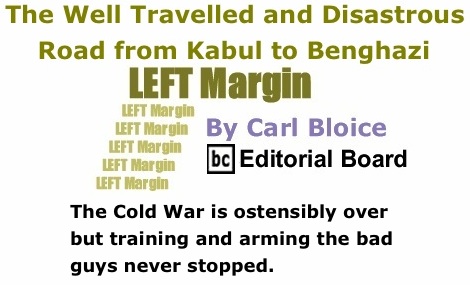




In his book Blowback,
published in 2000, the author and scholar, Chalmers Johnson, wrote:
“World politics in the twenty-first century will in all likelihood be
driven primarily by blowback from the intended consequences of the Cold
War and the crucial American decision to maintain a Cold War posture in
a post-Cold War world.” In 2003, in a preface to the book’s second
edition, he wrote that the attacks of September 11, 2001 “descend in a
direct line” from events in 1979, when the CIA launched “its largest
ever clandestine operation.” the secret arming of mujahideen to wage a
proxy war in Afghanistan against the Soviet Union, “which involved the
recruitment and training of militants from all over the Islamic world.”
“The blowback from the second half of the twentieth century has only just begun,” Johnson concluded.
Johnson died a couple years ago. I bet were he around today he would
spot the line – sometimes direct and other times indirect – running
from Afghanistan to Libya and on to Syria, and even touching on the
April 15 premeditated murder of innocents at the Boston Marathon.
Last week, the Financial Times wrote that Qatar had fallen into second
place when it comes to providing arms for the forces out to overthrow
the Syrian government. Partly, it said this is because of “concern in
the West and among other Arab states that weapons it supplies could
fall into the hands of an al-Qaeda-linked group, Jabhat al-Nusrah,
which has gained strength over the past year.” The story went on,
“Diplomats also say the Qataris have had trouble securing a steady
supply of arms, something the Saudis have been able to do via their
more developed networks. Those networks are a legacy of past endeavors
in places such as Afghanistan, where in the 1980s the Saudis helped
bankroll US-led support for Mujahedeen fighting against Soviet
occupation.”
The Saudis and the Qataris spent a lot of money recruiting,
transporting and arming fighters for the Libya war as well. There,
“Al-Qaida played a key role in toppling Gadhafi and remains a potent
threat,” UPI reported May 14.
The Cold War is ostensibly over but training and arming the bad guys never stopped.
I have no idea what really went on in official Washington following the
September 11, 2012 attack on the U.S. consulate in Benghazi but the
policy makers must have had serious concern about it appearing that
once again, forces unleashed by the U.S., Britain and France had
bit the hand that fed them.
Outside the devastated consulate after the attack, a young member of a
Libyan security team told an interviewer that the group suspected of
storming the building had been considered on the side of the good guys.
On May 14, New York Times columnist, David Brooks, made an intriguing
statement. “Furthermore, intelligence officers underestimated how
dangerous the situation was,” he wrote. “They erred in vetting the
Libyan militia that was supposed to provide security.” Maybe one day he
will elaborate.
Describing the emails that were turned over by the Obama Administration
to Congressional investigators, Eli Lake, the senior national security
correspondent for Newsweek, wrote May 14 in the Daily Beast that there
was “extensive discussion on the evening of September 14 about whether
the talking points should mention Anwar al-Sharia, a jihadist militia
member. The original CIA draft stated he was a likely participant in
the attacks. Victoria Nuland, the State Department spokeswoman at the
time, asked whether or not mentioning the group would prejudice the
investigation, and the FBI in later emails did not object (to what?).
Still, the final version excised the reference to Ansar al-Sharia as
well as a reference to Facebook posts the group had created suggesting
a link to the attacks.”
And how about the Tsarnaev brothers who
carried out the bombing in Boston that killed three and wounded more
than 260? A short time before the terror attack, the eldest, Tamerlan,
was in Manchester, NH having tea with a friend, Musa Khadzhimuratov, a
Chechen exile that the New York Times identified as a “former
separatist fighter.” He had once been a bodyguard for Akhmed Zakayev, a
Chechen separatist leader now living in London. On May 14, the FBI
searched Khadzhimuratov’s home, inspected his computers and gave him a
lie detector test.
Khadzhimuratov told the Voice of America that he and Tsarnaev the elder
had met three times, visited a local shooting range together and never
talked politics.
Then there is Graham Fuller, a high CIA official whose daughter married
Ruslan Tsarnaev, uncle of the Tsarnaev brothers, who, according to
numerous accounts, was quite familiar with the project to recruit and
train terrorists for use in the former USSR.
Because people in the “intelligence” community don’t usually talk out
loud about such things, we may never know the real story behind the
Moscow arrest of the U.S. spy with the ugly wig, pocket knife, compass
and roll of dollars. But no one has refuted the Russian’s claim that he
was trying to recruit a Russian who specializes in the affairs of the
North Caucasus. According to the Guardian (UK), “The US has not reacted
to the expulsion of Ryan Fogle, who Russia said was caught in a sting
operation last week while allegedly attempting to recruit an FSB agent
focused on anti-terrorism efforts in Russia’s North Caucasus.”
Throughout the Cold War, the CIA had “assets” in that troubled part of
the then Soviet Union that includes Chechnya and it has never ceased to
stir that pot.
Last week, CNN reported that “Russian authorities asked U.S. officials
to investigate Tamerlan before the trip, saying they believed he was
becoming increasingly involved with radical Islam. The FBI
investigated, but found no evidence of extremist activity and closed
the case.” U.S. officials probably had good reason to be wary about
following up on Russian warnings and inquiries about Tamerlan and
Dzhokhar Tsarnaev.
According to the Guardian (UK), “The US has not reacted to the
expulsion of Ryan Fogle, who Russia said was caught in a sting
operation last week while allegedly attempting to recruit an FSB agent
focused on anti-terrorism efforts in Russia’s North Caucasus.”
Last year, with the governments of Britain and France leading the pack
and the U.S. “leading from behind,” they launched yet another attempt
to use a popular political uprising to overthrow a government they once
wooed and then turned against. What has it wrought? According to UPI,
“Eighteen months after the downfall of Moammar Gadhafi, Libya remains a
powder keg with a government unable to control dozens of armed groups
whose lawless marauding has created a security crisis that’s driving
off desperately needed foreign investment.”
And, “Security officials say there are about 500 militias and armed
groups across Libya, most of them competing with one another. Libya's
Warrior Affairs Commission estimates these total around 250,000 men who
hold allegiance to warlords, tribal leaders and Salafist groups rather
than to the government that's struggling to emerge.”
Writing May 13 in the neoconservative organ Commentary, arch neocon Max
Boot described what he considers “the real scandal” around Benghazi -
“the shameful failure of the Obama administration to extend
state-building assistance to Libya’s pro-Western leaders after having
helped them to overthrow the Gaddafi regime. The inability of the
Libyan government to control its own territory created the conditions
that led to the 2012 attack – and those conditions have not changed
since.”
Boot went on to quote a recent Reuters dispatch from Tripoli that said
“More than 18 months after the fall of dictator Muammar Gaddafi,
Libya’s new rulers have yet to impose a firm grip on a country awash
with weapons. Rebel groups that helped to overthrow him are still
refusing to disband, and remain more visible on the streets than the
state security forces.”
Ethan Chorin, a former U.S. diplomat in Libya and expert on the Libyan
economy, chides the U.S. for having been “unprepared for the ability of
terrorist groups to undermine advances toward civil authority there.”
“In short, if the United States and its NATO and Arab allies had
learned from the Iraq experience and implemented a full, well-supported
plan for Benghazi, covering everything from technical assistance to
security and staffing, we might have averted the attack and the
momentum it has given to extremists.”
Boot and Chorin are both wise enough to know the history of such
endeavors but foolish enough to think the U.S. can or should step in to
bring it all under control and sort out the freedom lovers from the
reactionary extremists. The lesson they apparently draw from Iraq and
Afghanistan is: try it again.
Chorin, however, is clear on where he thinks the trouble began.
“Libya’s own ‘Islamist’ problem is itself a product in part of U.S.
wars in Iraq and Afghanistan– those conflicts attracted militants
looking to hone their skills in the war against Gaddafi; they returned
to fight in the Libyan Revolution, and many are now back in Syria
helping the Islamist factions within Syrian rebel ranks,” he wrote on
his blog May 4.
“US, British and French recipes for Syria’s future seem as fraught with
potential for disaster as their plans in 1916 or 2003,” wrote Patrick
Cockburn in the Independent (UK) May 12. “In saying that [President]
Assad can play no role in a future Syrian government, the US Secretary
of State, John Kerry, speaks of the leader of a government that has
still only lost one provincial capital to the rebels. Such terms can
only be imposed on the defeated or those near defeat. This will only
happen in Syria if Western powers intervene militarily on behalf of the
insurgents, as they did in Libya, but the long-term results might be
equally dismal.”
“Mr. Obama would not be a decent human being – let alone a leader – if
he did not have an urge to try to stop the killing in Syria,” wrote the
Financial Times chief foreign affairs commentator Gideon Rachman May
14. “He is hanging back because he does not have the answers to some
really crucial questions.
“If we supply weapons to the rebels, how do we know that it will not
simply lead to worse bloodshed? If western intervention is decisive
enough to tip the military balance, do we understand the nature of the
forces that will take control in Syria? Is there any way of ensuring
that a decent regime will emerge in Syria, short of a decade-long,
Afghanistan-style commitment to nation-building? (And, incidentally,
even Afghanistan has not worked out too well.)”
Bob Woodward has taken some flak for his view of the situation after he
had read the Administration’s internal emails. (“Oh, let’s not tell the
public that terrorists were involved, people connected to al Qaeda.
Let’s not tell the public that there were warnings.”) Well, I think
that’s more likely than Times columnist Maureen Dowd’s explanation (“In
the midst of a re-election campaign, Obama aides wanted to promote the
mythology that the president who killed Osama was vanquishing terror.
So they deemed it problematic to mention any possible Qaeda involvement
in the Benghazi attack.”). There were al Qaeda-linked “terrorists”
involved. And, there were warnings dating back to 2000 and “Blowback.”
When you lay down with dogs you get fleas.
In Syria and elsewhere, the U.S. is funding (with help of the freedom
loving Gulf monarchies), arming and training the same terrorists it is
said to be fighting in Yemen, Mali and Libya. The consequence would
seem to be inevitable. Those aren’t chickens. It’s a whole flock of
turkey buzzards coming home to roost.

BlackCommentator.com Editorial Board member and Columnist Carl
Bloice is a writer in





